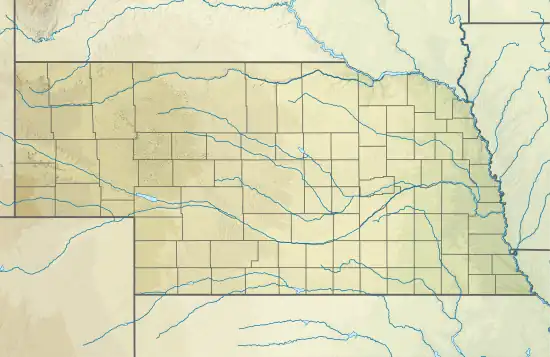Red Otter Creek
Red Otter Creek is a 13.09 mi (21.07 km) long 2nd order tributary to the Niobrara River in Knox County, Nebraska. This is the only stream of this name in the United States.[1]
| Red Otter Creek Tributary to Niobrara River | |
|---|---|
 Location of Red Otter Creek mouth  Red Otter Creek (the United States) | |
| Location | |
| Country | United States |
| State | Nebraska |
| County | Knox Holt |
| Physical characteristics | |
| Source | North Branch Verdigre Creek and East Branch Louse Creek divides |
| • location | about 8 miles north of Star, Nebraska |
| • coordinates | 42°38′57.00″N 098°24′10.29″W[1] |
| • elevation | 1,880 ft (570 m)[1] |
| Mouth | Niobrara River |
• location | about 4 miles northwwest of Pishelville, Nebraska |
• coordinates | 42°45′36.00″N 098°18′8.29″W[1] |
• elevation | 1,345 ft (410 m)[1] |
| Length | 13.09 mi (21.07 km)[2] |
| Basin size | 10.44 square miles (27.0 km2)[3] |
| Discharge | |
| • location | Niobrara River |
| • average | 1.96 cu ft/s (0.056 m3/s) at mouth with Niobrara River[3] |
| Basin features | |
| Progression | Niobrara River → Missouri River → Mississippi River → Gulf of Mexico |
| River system | Niobrara |
| Bridges | 887th Road, 888th Road, 891st Road |
Variant names
According to the Geographic Names Information System, it has also been known historically as:[1]
- Squaw Creek
Course
Red Otter Creek rises on the North Branch Verdigre Creek and East Branch Louse Creek divides about 8 miles north of Star, Nebraska in Holt County and then flows generally northeast into Knox County and to join the Niobrara River about 4 miles northwest of Pishelville, Nebraska.[1]
Watershed
Red Otter Creek drains 10.44 square miles (27.0 km2) of area, receives about 24.8 in/year of precipitation, has a wetness index of 518.81, and is about 3.19% forested.[3]
See also
References
- "Geographic Names Information System". edits.nationalmap.gov. US Geological Survey. Retrieved October 27, 2022.
- "ArcGIS Web Application". epa.maps.arcgis.com. US EPA. Retrieved October 27, 2022.
- "Red Otter Creek Watershed Report". watersgeo.epa.gov. US EPA. Retrieved October 27, 2022.
This article is issued from Wikipedia. The text is licensed under Creative Commons - Attribution - Sharealike. Additional terms may apply for the media files.